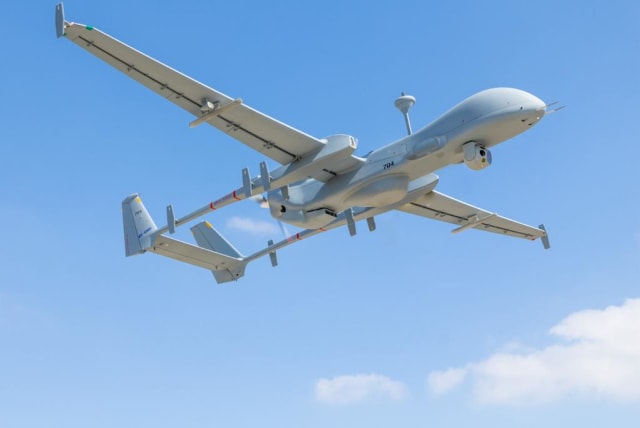Introducing the IAI Heron unmanned aerial vehicle (UAS)

Playing a strategic role in the Iron Swords War.
In the ever-evolving landscape of warfare, Unmanned Aerial Systems (UAS), more commonly known as drones, have emerged as crucial assets, with Israel Aerospace Industries (IAI) occupying a significant position with its HERON UAS. Over the years, these systems have transformed from intelligence and reconnaissance tools to multifunctional platforms, reflecting an evolution in modern warfare tactics. The Heron, with a wingspan of 17 meters, is the size of a small aircraft.
On the morning of October 7, 2023, the Heron Unmanned Aerial System arrived at Gaza at 07:15. Heron operators, controlling the drone from a remote location, employed its sensors and communications to gain situational awareness at higher command levels. Using onboard sensors, they collected information as quickly as possible, creating a situational picture to help the IAF command understand the situation and respond effectively. The Heron helped create an intelligence picture of real-time threats, which were neutralized by various means.
The Heron’s remote vehicle control station is equipped with communication systems for real-time communication with ground and air forces working together with the drone to neutralize any threat that arises. It is the world’s most advanced station of its kind and includes a classified operating column for sensors and connection and creation of real-time intelligence information. For example, after the horrific attacks of October 7, IAI’s Heron drones were dispatched to begin collecting and monitoring, and building an action plan to direct the forces on the ground. It has also assisted in turning the situation on the ground in favor of the IDF and ultimately, to the Gaza offensive.
The increased mission intensity on October 7 was enabled by operating a force mix of tactical and heavier Medium Altitude Long Endurance (MALE) UAS platforms equipped with various sensors and target acquisition components. This enabled the Air Force to operate in various missions.
Israel Aerospace Industries has been a pioneering force in the development of unmanned systems for more than four decades. The array of UAS in the HERON family, ranging from large, long-endurance craft to smaller tactical units, showcases a broad spectrum of capabilities. Importantly, these systems conform to stringent military airworthiness standards, allowing their integration into civilian airspace, a crucial achievement that was accomplished in 2022.
The IAF operates the Heron family of Unmanned Aerial Systems. These units are committed to strategic, operational, and maritime surveillance missions over land and sea, operating Heron UAS (referred to by the IAF as ‘Shoval’) and Heron TP (designated ‘Eitan’). Carrying payloads for surveillance and intelligence-gathering, Herons perform strategic, operational missions day and night, even in cloudy and stormy weather.
HERON Unmanned Aerial Systems play a pivotal role in Intelligence, Surveillance, and Reconnaissance (ISR) missions, operating various sensor payloads simultaneously to gather real-time intelligence over expansive areas. Their capacity to house specialized sensors enables reconnaissance, surveillance, and intelligence collection, including Synthetic Aperture Radar (SAR) and Electronic Intelligence (ELINT).
These systems have proven their value over the years, providing critical support to various military contingencies in different parts of the world, from aiding NATO forces in Afghanistan to recent deployments in Israel’s Iron Swords War. Their adaptability in various environmental conditions, including adverse weather, demonstrates their operational versatility.
With an operational endurance of more than two days per mission, Heron and Heron TP platforms currently perform tedious surveillance sorties for hours at a time. Operators are replaced with fresh teams every few hours, thus maintaining high alert without leaving the target area on rotations. Members of Israel’s standing army and reservists share the burden. Many squadron reservists are IAI employees tasked with developing, manufacturing, and operating the Heron family of UAS. They designed the Heron unified operator station, built with extended missions in mind. These workstations provide maximum efficiency and ease of use, employing the latest user interface to reduce operator workload and maximize mission focus.
The management of such a complex system demands sophisticated control interfaces. IAI’s Unified Control System (UCS) streamlines operator functions and supports diverse platforms and payloads, enabling tactical deployments in varied operational settings.
The system also integrates autonomous mission features, enhancing situational awareness and supporting human operators in decision-making. The data collected by these UAS is efficiently disseminated to support real-time decision-making processes.
The extensive operational history of the HERON UAS, clocking over 2,100,000 operational flight hours across multiple users, underscores their reliability and operational adaptability. These systems continue to play a crucial role in gathering intelligence and aiding targeted acquisition in challenging and hostile environments.
In essence, the evolution and strategic deployment of IAI’s HERON UAS symbolize the growing significance of unmanned systems in modern conflict zones. Their continued development and deployment remain vital in ensuring operational superiority and security in conflict zones worldwide.
IAI’S President and CEO Boaz Levy, said: "IAI's HERON Unmanned Aerial Systems stand as a testament to our commitment to innovation and excellence in the ever-evolving landscape of warfare. In the Iron Swords War, the HERON UAS family played a pivotal role, showcasing Israel’s operational versatility and adaptability in diverse environments.
In the face of the October 7 challenges, the HERON UAS demonstrated its strategic importance by providing real-time intelligence, supporting targeted acquisitions, and aiding in the neutralization of threats.
Israel Aerospace Industries continues to be fully committed to the IDF and the security forces while maintaining exceptional service and full supply to our partners worldwide.”
Jerusalem Post Store
`; document.getElementById("linkPremium").innerHTML = cont; var divWithLink = document.getElementById("premium-link"); if (divWithLink !== null && divWithLink !== 'undefined') { divWithLink.style.border = "solid 1px #cb0f3e"; divWithLink.style.textAlign = "center"; divWithLink.style.marginBottom = "15px"; divWithLink.style.marginTop = "15px"; divWithLink.style.width = "100%"; divWithLink.style.backgroundColor = "#122952"; divWithLink.style.color = "#ffffff"; divWithLink.style.lineHeight = "1.5"; } } (function (v, i) { });


